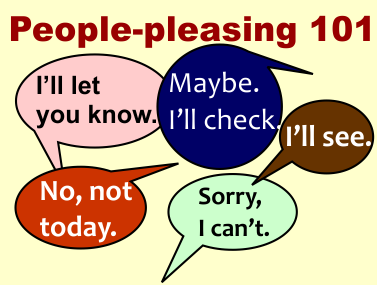










Popular Articles
Crazy-Makers: Dealing with Passive-Aggressive People
Why Are People Mean? Don't Take It Personally!
Struggling to Forgive: An Inability to Grieve
The Secret of Happiness: Let It Find You (But Make the Effort)
20 Steps to Better Self-Esteem
7 Rules and 8 Methods for Responding to Passive-aggressive People
What to Do When Your Jealousy Threatens to Destroy Your Marriage
Guide to How to Set Achieveable Goals
Catastrophe? Or Inconvenience?
Popular Audios
Audio Version of Article: Crazy-Makers: Passive-Aggressive People
Audio Version of Article: Why Are People Mean? Don't Take It Personally!
People-pleasing 101
by Monica A. Frank, PhD

Many PPs are overworked, stressed, and exhausted due to difficulty saying “no” to others in need. This can take a toll on their physical and emotional health. You have a limited amount of energy and time—if you use it up on others you are unable to care for yourself.
The good thing about people-pleasing is you don't have to change completely because a moderate amount of people-pleasing isn't a bad thing. It is only a problem in excess. If all the PPs could bottle up their excess people-pleasing and distribute it to those who don't care about pleasing others, the world would be a much nicer place.
However, since you can't do that, the solution for PPs, then, is to find balance. You need to find a way you can still help others but without hurting yourself.
Some possible ways to do this:
1) Care for yourself first. When you take care of others first, you will never have the time or energy for yourself. So you need to give yourself permission to make yourself a priority. When others make a request you can express this by saying: “I have some things I need to do for myself right now.” Even if what you need to do is sit quietly with a good book it is necessary to prioritize yourself and set limits. Otherwise you won't have much to give to others because you won't be able to replenish yourself.
2) Allot your time. Just like people figure out a financial budget, you can budget your time. Determine what you need for yourself and what you are able to give others. Then when someone makes a request of you, check your budget. This also allows you a way to respond to requests: “You know me—I'm always willing to help. But I need to check my schedule first.”
3) Allot your energy. Just because you have time doesn't mean you have the energy. So you also need to budget your energy. Some projects or people may require too much of your energy and drain you too quickly. When someone makes a request of you, assess how much of your energy it will take. Just because it may be a simple request doesn't always mean you have the energy for it. For instance, doing a task for a critical and demanding person may take more energy than for someone who is appreciative. Again, when you allot your energy, it provides a response to requests: “I'm sorry—I would like to help but I'm overworking right now.”
4) Don't agree immediately. The problem for many PPs is that they immediately respond to a request, agree to help, and then realize later the toll that it will take on them. Instead, get in the habit of delaying your response: “I need to check some things first. Let me get back to you tomorrow about this.”
5) Say “no.” PPs often have a great deal of difficulty saying “no.” So, if you can't just say “no”, go ahead and give an explanation or apologize or whatever you need to do to say “no.” If you notice the above examples, they aren't simply “no” but they have some sort of explanation, no matter how vague, attached to them. It may be too much to expect yourself to just say “no.” However, keep in mind that the more explanation you give, the more others can find a way to coax you to agree. It is best to keep your explanations somewhat vague.
6) Stay firm. With some people you may have to use the broken-record technique of repeating your response. Such as: “No, I said I need to check first. I'll let you know.” One way of staying firm with people who are persistent is to recognize that they aren't caring much about your needs but are only focused on getting what they want. By understanding this you can become more determined in your mind to take care of yourself.
Copyright © 2016 by Excel At Life, LLC.
Permission to post this article is granted if it includes this entire copyright and an active link.
Permission to post this article is granted if it includes this entire copyright and an active link.

More PsychNotes
Personality

Can Being Shy Affect Your Well-being and Relationship? Yes, but It Depends...
How Honest Are You?
Introverts are Important, Too!
Forgiveness Isn't Always a Virtue
Be Realistic! Not Optimistic!
Don't Be Too Unselfish in a Group--You Might Be Removed
Effects of Introversion When a Person has Panic Disorder
Are People Who Set More Extreme Goals At Risk for Depression or Mania?












